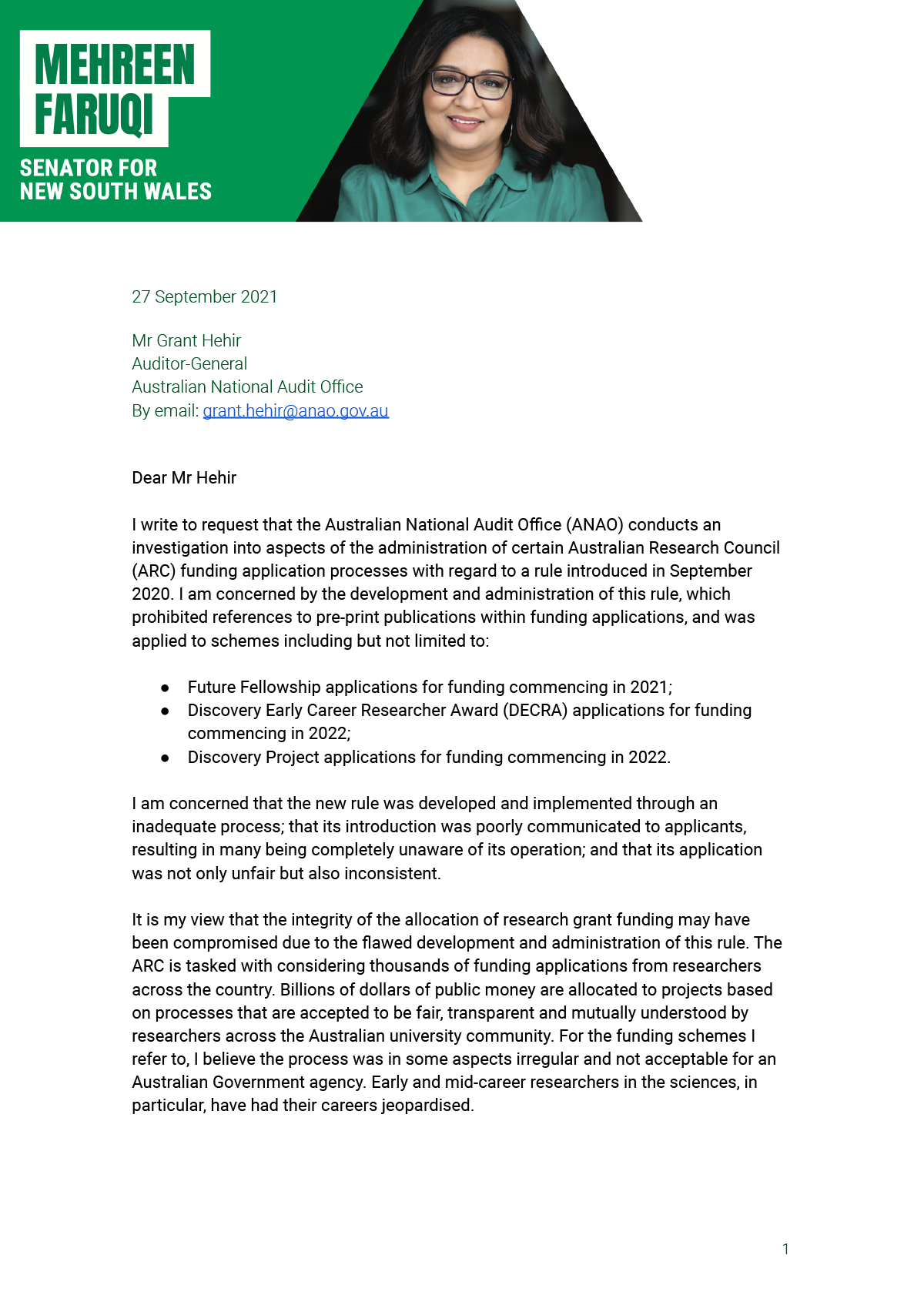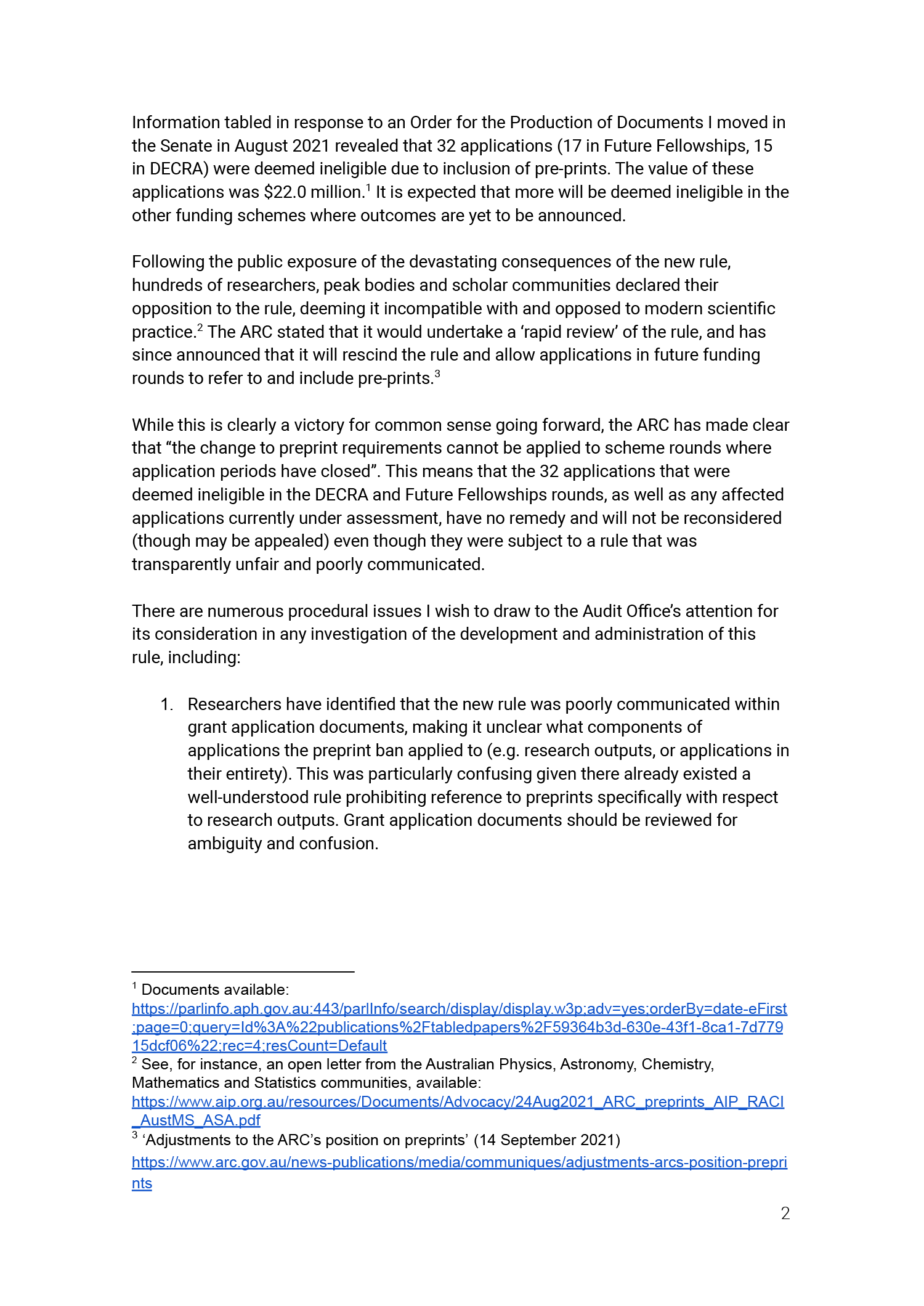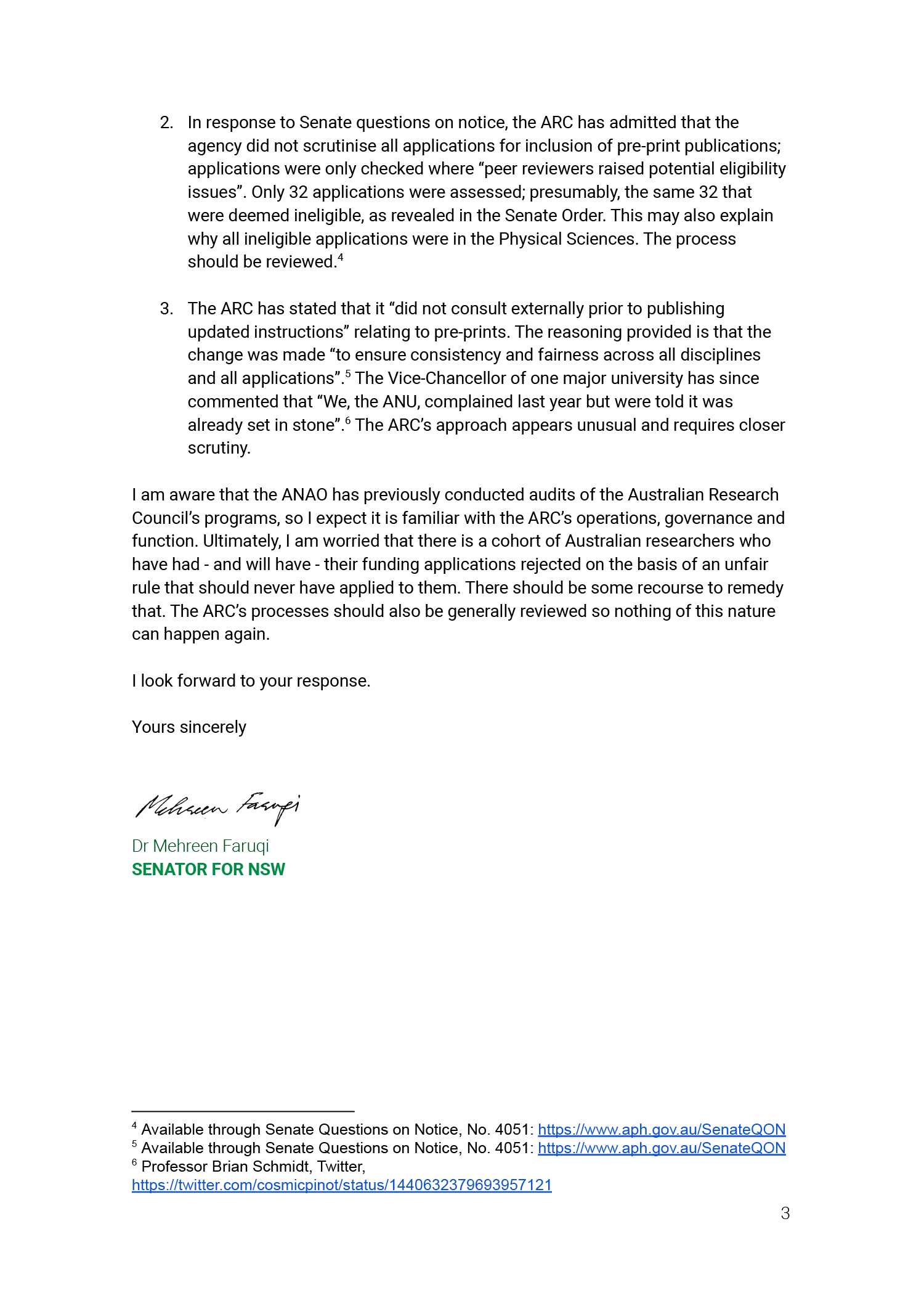Browse our range of reports and publications including performance and financial statement audit reports, assurance review reports, information reports and annual reports.
Australian Research Council’s administration of funding application processes
Please direct enquiries relating to requests for audit through our contact page.
The Auditor-General responded on 22 October 2021 to correspondence from Senator Mehreen Faruqi dated 27 September 2021, requesting that the Auditor-General conduct an investigation to examine the administration of the Australian Research Council's funding application processes.
Auditor-General's response
22 October 2021
Senator Mehreen Faruqi
Greens Senator for New South Wales
By email: Senator.Faruqi@aph.gov.au
Dear Senator Faruqi
Australian Research Council’s administration of funding application processes
I am writing in response to your letter of 27 September 2021 requesting the Australian National Audit Office (ANAO) examine the Australian Research Council’s (ARC’s) administration of funding application processes for the 2021 Future Fellowship, 2022 Discovery Early Career Research Award and 2022 Discovery Project schemes.
You raised concerns about a new funding rule, which was introduced by the ARC in September 2020, that prohibited references to pre-print publications within funding applications. As you note in your letter, the pre-print rule was rescinded by the ARC on 14 September 2021. On its website, the ARC acknowledged community feedback and noted that the rule did not reflect contemporary trends or the significance of pre- prints to open research and equity across disciplines and career stages.
The ARC’s appeal mechanisms are listed on its website. The ARC's Grant Guidelines make provision for an appeals process in relation to administrative process issues. In its 14 September public statement, the ARC noted that while the change to preprint requirements could not be applied to scheme rounds where application periods had closed, the appeals process for unsuccessful applicants who wish to appeal, will ‘be progressed as a matter of priority’. The ARC has provided assurance that appeals relating to the rescinded pre-print rule will be considered. I also understand that alternative external appeals mechanisms are available.
The ANAO conducted an audit of the ARC’s grants administration, which included the Discovery and Linkage grants programs. Auditor-General Report no 5 of 2019–20, Australian Research Council’s Administration of the National Competitive Grants Program (NCGP), found the ARC’s administration of the NCGP to be effective.
I have considered your request in the context of the ARC’s response to the issue, the existing mechanisms for appeal, previous audit findings and other priorities for audit coverage across the public sector. I have decided that the matter you referred should not replace other areas of audit focus identified in the ANAO’s Annual Audit Work Program 2021–22.
Yours sincerely
Grant Hehir
Correspondence from Senator Mehreen Faruqi



Transcript of letter from Senator Mehreen Faruqi
27 September 2021
Mr Grant Hehir
Auditor-General
Australian National Audit Office
By email: grant.hehir@anao.gov.au
Dear Mr Hehir
I write to request that the Australian National Audit Office (ANAO) conducts an investigation into aspects of the administration of certain Australian Research Council (ARC) funding application processes with regard to a rule introduced in September 2020. I am concerned by the development and administration of this rule, which prohibited references to pre-print publications within funding applications, and was applied to schemes including but not limited to:
- Future Fellowship applications for funding commencing in 2021;
- Discovery Early Career Researcher Award (DECRA) applications for funding commencing in 2022;
- Discovery Project applications for funding commencing in 2022.
I am concerned that the new rule was developed and implemented through an inadequate process; that its introduction was poorly communicated to applicants, resulting in many being completely unaware of its operation; and that its application was not only unfair but also inconsistent.
It is my view that the integrity of the allocation of research grant funding may have been compromised due to the flawed development and administration of this rule. The ARC is tasked with considering thousands of funding applications from researchers across the country. Billions of dollars of public money are allocated to projects based on processes that are accepted to be fair, transparent and mutually understood by researchers across the Australian university community. For the funding schemes I refer to, I believe the process was in some aspects irregular and not acceptable for an Australian Government agency. Early and mid-career researchers in the sciences, in particular, have had their careers jeopardised.
Information tabled in response to an Order for the Production of Documents I moved in the Senate in August 2021 revealed that 32 applications (17 in Future Fellowships, 15 in DECRA) were deemed ineligible due to inclusion of pre-prints. The value of these applications was $22.0 million.1 It is expected that more will be deemed ineligible in the other funding schemes where outcomes are yet to be announced.
Following the public exposure of the devastating consequences of the new rule, hundreds of researchers, peak bodies and scholar communities declared their opposition to the rule, deeming it incompatible with and opposed to modern scientific practice.2 The ARC stated that it would undertake a ‘rapid review’ of the rule, and has since announced that it will rescind the rule and allow applications in future funding rounds to refer to and include pre-prints.3
While this is clearly a victory for common sense going forward, the ARC has made clear that “the change to preprint requirements cannot be applied to scheme rounds where application periods have closed”. This means that the 32 applications that were deemed ineligible in the DECRA and Future Fellowships rounds, as well as any affected applications currently under assessment, have no remedy and will not be reconsidered (though may be appealed) even though they were subject to a rule that was transparently unfair and poorly communicated.
There are numerous procedural issues I wish to draw to the Audit Office’s attention for its consideration in any investigation of the development and administration of this rule, including:
- Researchers have identified that the new rule was poorly communicated within grant application documents, making it unclear what components of applications the preprint ban applied to (e.g. research outputs, or applications in their entirety). This was particularly confusing given there already existed a well-understood rule prohibiting reference to preprints specifically with respect to research outputs. Grant application documents should be reviewed for ambiguity and confusion.
- In response to Senate questions on notice, the ARC has admitted that the agency did not scrutinise all applications for inclusion of pre-print publications; applications were only checked where “peer reviewers raised potential eligibility issues”. Only 32 applications were assessed; presumably, the same 32 that were deemed ineligible, as revealed in the Senate Order. This may also explain why all ineligible applications were in the Physical Sciences. The process should be reviewed.4
- The ARC has stated that it “did not consult externally prior to publishing updated instructions” relating to pre-prints. The reasoning provided is that the change was made “to ensure consistency and fairness across all disciplines and all applications”.5 The Vice-Chancellor of one major university has since commented that “We, the ANU, complained last year but were told it was already set in stone”.6 The ARC’s approach appears unusual and requires closer scrutiny.
I am aware that the ANAO has previously conducted audits of the Australian Research Council’s programs, so I expect it is familiar with the ARC’s operations, governance and function. Ultimately, I am worried that there is a cohort of Australian researchers who have had - and will have - their funding applications rejected on the basis of an unfair rule that should never have applied to them. There should be some recourse to remedy that. The ARC’s processes should also be generally reviewed so nothing of this nature can happen again.
I look forward to your response.
Yours sincerely
Dr Mehreen Faruqi
SENATOR FOR NSW
Footnotes
1 Documents available: https://parlinfo.aph.gov.au
2 See, for instance, an open letter from the Australian Physics, Astronomy, Chemistry, Mathematics and Statistics communities, available: https://www.aip.org.au/resources/Documents/Advocacy/24Aug2021_ARC_preprints_AIP_RACI_AustMS_ASA.pdf
3 ‘Adjustments to the ARC’s position on preprints’ (14 September 2021) https://www.arc.gov.au/news-publications/media/communiques/adjustments-arcs-position-preprints
4 Available through Senate Questions on Notice, No. 4051: https://www.aph.gov.au/SenateQON
5 Available through Senate Questions on Notice, No. 4051: https://www.aph.gov.au/SenateQON
6 Professor Brian Schmidt, Twitter, https://twitter.com/cosmicpinot/status/1440632379693957121